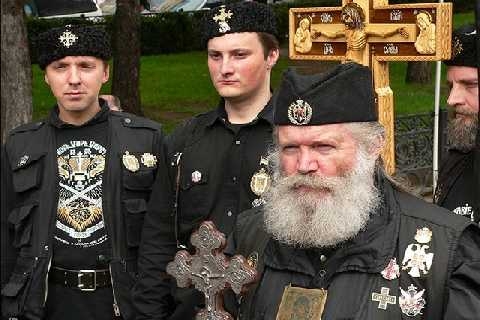In fact, the reality is much more complicated and cannot be reduced to any simplified position. The Christian East and West are connected and separated by mutual nostalgia and rivalry. These attitudes are also reflected in the internal situation of the Russian Orthodox Church. So the different orientations within the Orthodox Church reflect the various cultural and spiritual positions of the different groups which define themselves in relation to Western Christianity (both catholic and protestant). But the current relationship between Orthodoxy and Catholicism, particularly between Moscow and Rome, has become especially over the last years one of the most tangled chapters in the history of ecumenism. One may often hear the question: Why isn't the Catholic Church able to have real dialogue with the Orthodox Church, despite feeling very close to Orthodoxy in terms of its dogmatic and, first of all, moral character?
In order to find an answer, we should break the question down into its most essential elements. Let us ask ourselves therefore: who are the Orthodox when seen through an ecumenical lens: what reasons are there for them to distance themselves from or to draw near to other Christian denominations; and finally, what are our hopes for unity rased upon?
The West often views Orthodox Christians as a tight and homogeneous mass of believers, speaking with one single voice, through that of its highest representatives. Certainly, this is too simplified a vision. If we take all those baptized into the Orthodox Church, we can divide them up (schematically) into three groups: fundamentalists, ecumenists and traditionalists.
Orthodox fundamentalism comes in two versions: ecclesial-theological and political. The former, which calls itself "the true orthodoxy" is widespread among monastic, conservative or dissident circles and holds that, in the hard-lined spirit of St. Cyprian of Carthage (III century), all communities which, due to their own errors, have cut themselves off from the sole Church of Christ (i.e. the "Orthodox" community), have lost everything, having no real sacraments, nor grace or salvation. Ecumenism, therefore, is a misleading and dangerous heresy. And with it come all the ancient heresies, like Aryanism, or disbelief in the sole, holy, true and visible Church. What kind of dialogue can there be for those who have chosen their own downfall and, strictly speaking, don't exist ecclesiologically? Whoever wants to be saved must first of all request to be baptized into the Orthodox Church and then live according to her rules.
It should be said that "true Orthodoxy" (sometimes organized in little schismatic Churches in strong and direct opposition to the Moscow Patriarchate) criticises not so much the Western confessions (which in any case are meant to be automatically condemned) as so called "world Orthodoxy" (including the Russian and all the other canonical Orthodox churches) for their compromises and even contacts with un-Orthodox communities. What does "compromise" mean? It could entail, for example, taking part in a common prayer with those who don't belong to the true Church. The 45th Apostolic Canon clearly states: "Any bishop or priest or deacon who has only prayed with a heretic will be excommunicated. If he allows them to do anything as servants of the Church, he will be thrown out". This text is endlessly quoted in the "true Orthodox" writings. Common sense might object: 'Times have changed, we can't take all the ancient rules literally. And what does "heresy" mean in the actual context?" If adhering to the logic of a "true Orthodox", one could respond: "All the Canons and Rules of the first seven Ecumenical Councils are not limited by any historical time and can not be changed; our Church is called Orthodox because it did not add anything to the legacy of the apostolic and patristic Tradition and did not take anything away from this legacy. It is the same Church Christ had built, which was revealed by the Holy Spirit in the actions and dogmas of those godly men, whom we called the Holy Fathers. The other Christian communities have nothing to do with the true and unique Church and ecumenism as such manifests a lack of the faith in the Creed. It is worse than heresy".
It should be said that this position has become very influential -not in the institutional, but in the ideological and popular sense. Any contact with the West in fundamentalist's eyes smells of betrayal. For example, the visit in France of Patriarch Alexis to the Cathedral of Notre Dame de Paris, of some years ago, which was perceived in Europe as an almost solemn act of reconciliation between East and West, in Russia was instead severely criticised by certain circles for a mere suspicion (which was not however confirmed) that he might have participated in the common prayer with Catholic prelates.
If we compare this atmosphere with the so called "official ecumenism" of the Sixties and the Seventies, the contrast is evident. In those days the Orthodox Church saw its Western colleagues as the natural allies and at the same time the communist State used "official ecumenism" for promoting its policy by unofficial methods. "Official ecumenism" has failed together with the system that had generated it while Orthodox people have become a sort of bastion of resistance against the massive invasion of the Western mass culture that began towards the end of the eighties. Enemy Number One for this kind of spirituality is so called globalisation. What do they do about all that? In fact, we are talking about the world as a whole with its history. This history is rejected or, better to say, it is viewed as history of the "last times". End time apocalyptic ideology is very popular in today's traditionally orthodox countries.
For this reason it is not always easy to separate spiritual fundamentalism from its social and political expressions, because in fact it has become the political movement, mainly fostered by ex-members of the communist party, recycled as full blown nationalists. In orthodox circles this is a recent phenomenon, linked above all to the traumatic changes occurred in the life style of former communist countries. The movement is also supported by fanatics waving "Orthodoxy or Death" banners. Yet their faith is a very special type of Orthodoxy, placing "monster-saints" like Ivan the Terrible and Rasputin, on high pedestals, singing the praises of absolute monarchy and seeking the total prohibition of activities of all other religions in the Land of Orthodoxy. It refuses to have any relations with other Christian denominations. The mere thought of it is considered as treason. Some bishops are also partisans of the faction. However, fortunately none of them is a member of the Russian Church's Holy Synod.
Inside the Russian Orthodox Church, the ecumenical-oriented group is by far the smallest, as it is not always easy to show open sympathy for other Christian communities. This group does not have any political influence, but has a strong cultural presence. It attracts people searching for a cure-all for Orthodoxy's "diseases", found first of all in a unity with the Catholic Church. These "diseases" are namely fundamentalism, conservatism and closed-mindedness to contemporary society.
Ecumenists (one may say that this word in not considered to be a positive term in Russia) have often an idealized image of the Western Church. They expect to find moral and spiritual relief by "airing out their homes", which have become stale and musty to them. They seek help in overcoming the autocracy of bishops who can still be very close to the master-servant relation when an ordinary priest has no rights in front of his superior. The system of Church justice with its legal procedures practically does not exist as yet. The ecumenists expect to find a stimulus for embarking on new ways and new methods of proclaiming the Gospel - or simply to find a little help in leading their ecclesial lives in a more human and peaceful setting.
In very truth, for the time being the ecumenical movement should be referred to at present as an ecumenical mood, because the movement as it was has come to a halt. It no longer has any influence or institutional role within the Russian Church. On the contrary, for fear of persecution, it leads a semi-clandestine existence. Therefore, I believe that "underground ecumenists", including the clergy, are more numerous than meets the eye. There is no doubt that the everlasting tensions felt between the Vatican and Moscow place them in an even more vulnerable position. The "ecumenical fraction" of the Orthodox Church has already obtained unity with the western Church - but in the mystical and human sense, even if not in the canonical and Eucharistic sense of the word. And this "half-way" unity makes them deeply suffer as they obeying the historical Church which is separated from the fullness of the sole and universal Church of Christ, which -as ecumenists perceive it - is due to a misunderstanding.
Yet the most numerous and influential group, though rather silent, of any Orthodox Church is what may be called the "traditionalist" one. When using this term we must not imply any criticism or form of disdain for Tradition. Rather, it is a synonym for fidelity. The traditionalists wholeheartedly believe all that the Church proclaims and teaches, are rooted in her dogmatic and patristic heritage. They nourish not only the spiritual, but also the deep-rooted love that is inherited by the Faith and guarded by the Church, including the lives of the saints, the tonality of hymns, the solemnity of celebrations, the language of prayer, the semi-darkness of the churches and their icons.
Traditional orthodoxy is faith incarnate. It can never separate the ascetic spirit from the living "flesh"; from its physical, historical, national and sometimes even ethnic body. There can be no ecumenical dialogue with the Orthodox, if one does not bear in mind this attachment of faith to its local concrete realities. This includes its land, people and homeland. If this psychological baggage is respected, then Orthodox traditionalism will open itself up to dialogue. Otherwise even this part of Orthodoxy could become anti-western, closed and self-sufficient to the point of verging on fundamentalism. One has to grasp the deep sentiments of this group. If for most Catholics and Protestant keeping up with the times is considered a religious effort as well, for most Orthodox being Christian means "being faithful to the faith of the Fathers of the Church", even at the price of being culturally and psychologically cut off from the world.
To this traditionalist group belongs the greater part of the Church hierarchy. It can be ecumenical and anti-ecumenical, because each position depends on the situation, on the political moment, on the personality of the Pope of Rome, on external influences. The traditionalists. I repeat, are the largest and most representative group; but now to be a traditionalist means you don't participate at all in ecumenical initiatives, by essentially shunning them.
If we ask: what is the situation of ecumenism today? We say there are possibly three answers. The first is that everything is going quite well and will keep getting better, since we live in an age in which we are searching for the treasure of a common faith, which is becoming imperative for today's Christians. Despite certain political obstacles, Christians of the great traditional Churches are aware of the fact that unity among them is not only right, but is also near and imminent. This point of view proclaims that there is no alternative to ecumenism because our age is the time in which the imperative of unity has been finally realized.
The second answer states that, quite frankly, everything is going quite bad. The permanent crisis between Moscow and the Vatican, or rather, between Russia and the West, in spite of some good signs and broad smiles, which have never even for a moment given any concrete result, is indeed testimony to the fundamental differences between the two incompatible civilisations. The so-called "ecumenism" of Eastern European Churches in past decades was nothing more than a form of diplomacy: a choice imposed by communism and its politics. Today the instigator of this strategy, the Soviet regime, no longer exists. And thus the phoney talk about unity has faded away, and the big bear of Russian nationalism has come out of its cave with its paws lifted high against those hands raised in favour of dialogue.
The third answer is that the Russian Church - like the other Orthodox Churches in former communist countries - is seeking true and meaningful dialogue with other Christian faiths. But just after being freed from the yoke of atheistic totalitarianism, it has been immediately besieged by eastern and western religious aggressors. This is especially so with regard to the Catholic Church, which after Vatican Council II proclaimed herself a sister Church. All this new religious presence has invaded the canonical land of Russian Orthodoxy, making efforts to spread its heritage of history and faith as if in missionary territory. Worse still, some believe the Catholic Church sees Russia as a market to sell its very own "product" by taking advantage of its material weaknesses and lack of Orthodox clergy and personnel "to steel sheep from other people's flocks" (one only has to think of the infinite number of priests and bishops martyred during 70 years of communism).
Many people in the West believe that the decisive role in ecumenical affairs belongs only to a patriarch, actual or future, who can pave the way for his Church. As a matter of fact, the situation is more complicated. In general the role of the Orthodox patriarch is not well understood in the West. He is often seen as another pope. Yet according to Orthodox ecclesiology, the Church's patriarch is only her top bishop. It is almost sacrilegious to call him the Church's chief or head, since only Jesus Christ can be the head of the Church.
As a symbolic figure of the Church the patriarch holds an enormous responsibility, not always balanced by his prerogatives. He is not the unique guardian of the Orthodox faith, since the faith is entrusted to the whole Church, both to her pastors and laity. His responsibility is threefold: it is before God, before the Church herself (represented by the Synod, the ranks of bishops, and all the faithful, whom the Faith must safeguard and protect through its dogmatic purity) and before fellow brothers and sisters in the faith and other patriarchs of local Churches with whom he is in communion.
The weight of such responsibility sometimes poses a problem for his personal freedom, which is quite different from that of the Roman Catholic pontiff. The pope has real freedom in decision making. Many innovations and changes, approved or not by the Roman curia, are the fruit of the pope's intuition and charisma. Yet if the Orthodox patriarch were to dare to reform Tradition alone, he would be simply ousted by the Synod or even directly by the Orthodox faithful themselves.
We must forever bear in mind this possibility, when referring to gestures (made or not made) or to meetings (which have not occurred) between the pope and Moscow's patriarch. Even if he is commemorated more often and more solemnly during the celebrations than the pope is during the Roman mass, indeed he seldom has any great opportunity to express his own personality in the Church, of which he is the highest representative.
No patriarch alone can touch any part of the Faith's sacred inheritance, handed down by the Church Fathers. Not even local Church councils can do this, despite holding the highest power. Only an Ecumenical Council can: in terms of doctrinal matters it has the highest authority, that is, the power of the Holy Spirit (according to Acts 15:28). The Ecumenical Council has the right to change or "update" such sacred teachings and traditions, yet only under a spirit of fidelity to such past councils. But the last, the seventh Ecumenical Council of then undivided Church of God was called ages ago, in the year 787, in order to defeat and condemn the iconoclasts.
Summing up, one should say that the situation is not stable; it can change at any turn of current history. The historical moment that Russia (and other post-Soviet countries) has been experiencing over the last 15 years is characterised by an intense search for her national identity in open or hidden contrast with the West and its values. There is no doubt the Orthodox Church, who is aware of being the core of this identity, is also engaged in this process. Many people in post Soviet countries perceive that this identity is threatened and this sentiment provokes the antiecumenical reactions mentioned before.
But do perspectives of dialogue and reconciliation really exist? I believe there is some outlook of hope.
First of all, this period of so-called spiritual isolation should pass away as has always been the case in Russian history, while the next period will be one of openness, in which Russian identity will be discovered in its spiritual kinship with Europe.
The second point. I see a certain perspective in the multiplication of ecumenical initiatives at the local level (such as our conference), but especially in the sisterhood and brotherhood between individual parishes coming from different countries, the contacts between priests, pastors, laypersons and so on.
The third point. I believe in so-called spiritual ecumenism, in the exchange of gifts, which helps us to open ourselves up to the values of another Christian faith. To be more concrete: the true vocation of ecumenism is to discover the image of Christ, the mystery of Christ in the faith of the other and to help the others recognize the orthodox Christ in their faith. We must not be naive: after centuries of separation, division between the Christian faiths has become very profound, but under this division there is another depth, another indescribable and indivisible reality that belongs solely to Jesus Christ, our Lord.
Vladimir Zelinskij


